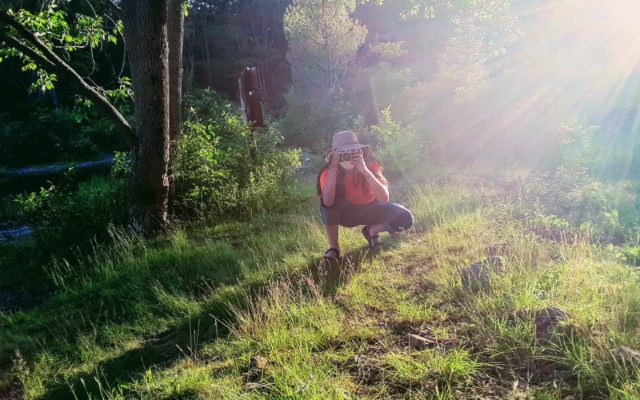
Katahdin-area teens tackle solo projects in Baxter State Park this summer
Maine teens who normally help maintain trails in one of Maine’s most famous parks were afraid they might lose their jobs this summer due to COVID-19. Instead, they were surprised with a new assignment, one that involved delving into the park in ways they never had before.
The Baxter Youth Conservation Corps, a program organized and funded by Friends of Baxter State Park, hires Katahdin area teens every summer to conduct trail work in Baxter State Park. But this year, instead of working on a trail crew — which would have been impossible while practicing safe social distancing — the teens were asked to select one aspect of the park to study independently.
The topics they chose ranged from mushrooms to native culture to fisheries biology.
“The park was just something that I thought of casually, just going in to enjoy once in a while,” said Emma McGraw, 17, of Sherman, one of the program’s eight participants. “But through this program, it’s just been really cool to dive deeper and learn more about the history of the park and the features in it and the forest ecosystem — how everything is really connected.”
This was McGraw’s second year working for the Baxter Youth Conservation Corps, which is a service-learning program that’s organized and funded by the nonprofit organization Friends of Baxter State Park. Usually, the program hires 20 local high school students for full-time employment each summer, paying $14 to $17 per hour for clearing trails, building bridges and installing rock steps.
“It’s a great job to have,” said Anne Shearer, 18, of Millinocket, who has participated in the program for two years. “Full-time work that pays well is really something that kids my age, or even adults, can have trouble finding up here.”
This spring, due to the outbreak of COVID-19, it quickly became apparent that the program could not move forward as usual. Trail work often requires people to work in close proximity to move and balance heavy objects, which makes social distancing impossible, said Aaron Megquier, executive director of Friends of Baxter State Park. In addition, the crew typically travels together by packing into a van.
“It became clear that we had to make some significant changes,” Megquier said. “Our youth participants were counting on the work, and we feel very strongly about the benefits of the program for the park and local communities. We were able to pivot quickly in June and develop a modified, socially distant program that we are calling our 2020 Conservation Fellows.”
The program lasted six weeks (instead of the typical three) and only accepted older teens with previous experience in the Baxter Youth Conservation Corps, due to the independent nature of the work. The teens were required to spend at least two days a week exploring the park to collect information, photos and video, as well as time outside the park devoted to study and creating a final presentation and body of work.
“All of their projects took different forms,” Megquier said. “Some of them are written pieces, some of them are photos or in video format.”
In the future, the projects may be used by Friends of Baxter State Park as educational content for park visitors.
“It was really cool this year to do a deeper dive into the history of the park,” said Shearer, who chose to research the history of Katahdin Lake for her independent study. “I really hadn’t known much about it before doing the project.”
Shearer hiked the 3-mile trail into the lake many times during her project to learn about the area first-hand. She also learned about the controversial acquisition of the property by the park in 2006. And she interviewed the people who used to run the historic Katahdin Lake Wilderness Camps, which were built along the lakeshore in 1885.
Another Conservation Fellow focused his study on mushrooms in the park, with the goal of creating a guide that visitors can use. While others focused on native culture, fisheries biology and the park’s vast system of backcountry hiking trails.
Teens who have worked for the Baxter Youth Conservation Corps in the past have gone on to pursue careers in the conservation or outdoor recreation fields. One is now a ranger in the park, Megquier said, while another is working for a trail organization in the Katahdin area.
“I looked at my mom the other day and said, ‘I don’t want this to stop. I want to keep going into the park all the time and exploring,’” McGraw said. “Once you start, it’s kind of a lifetime thing of learning more about it and caring about it and enjoying it. This program definitely opened me up to that.”